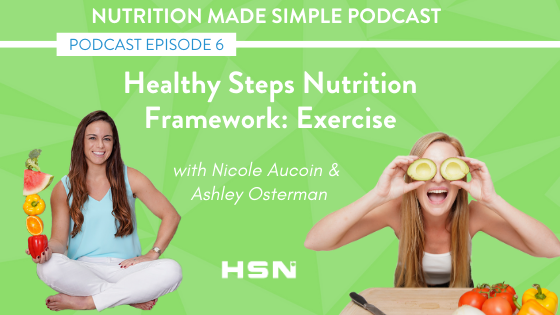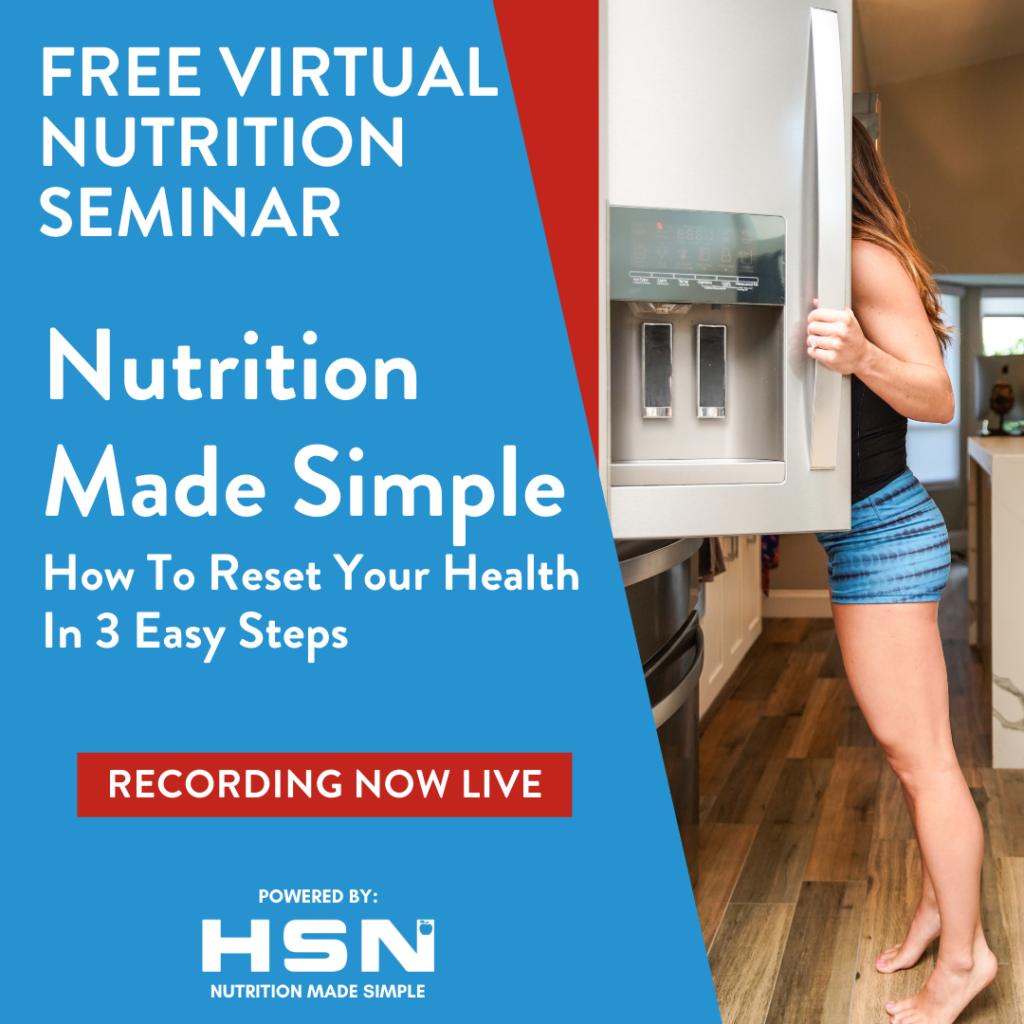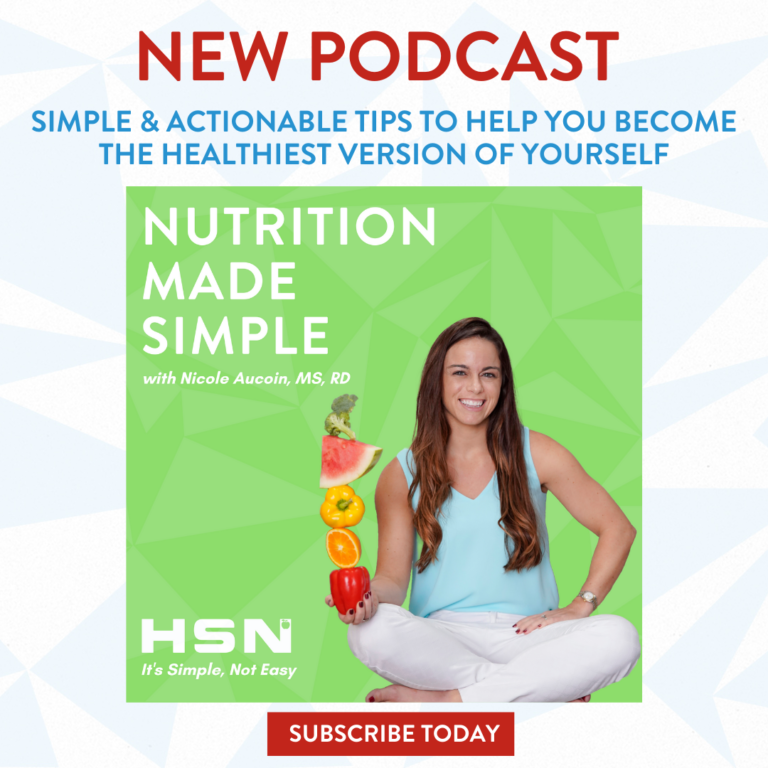Today, Nicole Aucoin and Ashley Osterman discuss the fifth pillar of the Healthy Steps Nutrition Framework: Exercise.
I recently conducted a poll, what is easier to get started — a nutrition or fitness routine? Over 90% said that exercise was easier.
If you think about it, this week is historically the busiest week for gyms worldwide. People are motivated to finally see the results they are looking to join a gym.
Here’s the problem, they don’t have the coaching, and they don’t have the accountability to stick with it. That’s the reason why over 80% of people have ditched their resolutions and stopped going to gyms by the second week in February.
In this episode, Ashley and Nicole discuss:
- The importance of exercise
- The importance of finding something you like
- How to build exercise into your routine
Our mission is to empower 4k people in January to ditch the all or nothing mentality and take control of their health one step by listening to this podcast.
Do you know someone who is looking to lose weight? We would love for you to share this podcast with them! You never know who could use some words of encouragement — take a screenshot, post it on social media, and tag @healthystepsnutrition so your friends can find this awesome free help! Also, don’t forget to subscribe to listen to every episode!
PODCAST EPISODES TO LISTEN TO ON THE ADDITIONAL PILLARS OF THE HEALTHY STEPS NUTRITION FRAMEWORK
Episode Transcript:
Nicole Aucoin (00:06):
Welcome back to The Nutrition Made Simple podcast. At Healthy Steps Nutrition, we believe something as fundamental as nutrition shouldn’t be complicated, which is why we focus on a simple habit-based approach when working with clients. We’ve helped over 30,000 people around the world take control of their health through our simple habit based approach. I’m your host, Nicole Aucoin, registered dietitian and founder of Healthy Steps Nutrition, CrossFit HSN, and HSN Mentoring. I’m also the author of the Healthy Kids Cookbook: 100% ‘Kid-Approved’ Recipes For The Whole Family. You can get that on Amazon. In this brand new podcast, we will be teaching you how to take one step at a time to becoming the healthiest version of yourself.
Nicole Aucoin (00:56):
Today, Ashley and I are going to discuss the fifth pillar of the Healthy Steps Nutrition Framework, exercise. I recently conducted a poll on social media asking, “What would be easier to get started, a nutrition or exercise routine?” Over 90% of people said exercise was easier. It was harder to get started with a nutrition routine. Why do you think that is? Well, if you think about it, historically, the first and busiest week of the year is the busiest week for gyms worldwide. People are motivated to finally see the results they’re looking for so they go into the gym every single day, sometimes spending hours. But what happens? Here’s the problem, they don’t have a coach. They don’t have the accountability to stick with it. That’s the reason why 80% of people have ditched their New Year’s resolutions and stopped going to the gym by the second week in February.
Nicole Aucoin (01:55):
In this episode, Ashley and I are going to discuss the importance of finding your exercise routine, the importance of finding something that you like that you can do consistently and how to build exercise into your routine. This is key. We will get to this episode on exercise right after this message.
Nicole Aucoin (02:20):
Our mission at Healthy Steps Nutrition is to empower 4,000 people in January to ditch the all or nothing mentality and take control of their health one step at a time by listening to this podcast. Do you know someone who’s looking to lose weight? We would love for you to share this podcast with them. You never know who could use some words of encouragement. Take a screenshot and post it on social media, then tag @healthystepsnutrition, so your friends can find this awesome free help. Don’t forget to subscribe to this podcast so you catch every single episode. Enjoy this episode on exercise.
Nicole Aucoin (03:04):
Ashley Osterman, welcome to the Nutrition Made Simple Podcast.
Ashley Osterman (03:07):
Thanks Nicole. I’m really excited about this episode today, because I know that it’s something that you are very passionate about and that we all really enjoy.
Nicole Aucoin (03:19):
Exercise is something that is so important and such a part of my personal life, it’s how my husband and I met at a CrossFit gym. And it’s just a really great way to stay active. There are so many health benefits in regards to exercise.
Ashley Osterman (03:37):
Yeah, physical activity, doing regular physical activity has been shown to benefit many aspects of our lives, including brain health, weight management, reducing disease, strengthening bones and muscles, and improving the ability to do everyday activities. Regular exercise can also reduce your risk of depression and anxiety as well as help you sleep better, as we talked about in our last episode.
Nicole Aucoin (04:05):
I think in this season, people are more stressed and so many people used to exercise and just moving as an amazing stress relief. I know I did. And it can be intimidating for some people if you’ve never exercised before, or you’re the type of person that’s like, “I don’t understand how people can actually like to exercise.”
Nicole Aucoin (04:26):
And at the moment when you’re working really hard in a CrossFit workout, we own a CrossFit gym, we love CrossFit, but at that moment, I don’t know that anyone’s like, “This is awesome.” But you go in there knowing I’m going to feel better after I get done, and at the end, no one’s ever regretted a workout.
Ashley Osterman (04:46):
No, not at all. You get that amazing feeling of, I just came and I conquered and this is going to help me be a stronger person.
Nicole Aucoin (04:55):
The cool thing is, is that it doesn’t have to be the same thing for everyone, and there’s no one perfect type of exercise.
Ashley Osterman (05:01):
No.
Nicole Aucoin (05:01):
You just have to figure out what works for you and what you like to do and do it consistently, and that’s the most important piece of the puzzle. So many people around the New Year will join a gym. They’ll go to that gym for one week, and the gym is over-packed and then by the middle of February, people are done. The gym is dead again, and-
Ashley Osterman (05:19):
It’s empty, yeah.
Nicole Aucoin (05:20):
And the thing is, is because they didn’t find what they truly love and what works for them, you go all in and then you get overwhelmed. And especially if you haven’t exercised in a while, getting back into it, you get sore, and it hurts. It’s not fun the first week, because you are so sore. But once you get into a good routine you really do feel those benefits, you do sleep better. You realize, “Hey, this is actually how I manage stress. I can actually perform better at work because I’m exercising regularly.”
Ashley Osterman (05:49):
Yeah, I know for me, without exercising, my energy is just so low. To keep up with my toddler, if I don’t exercise, I’m having a rough time. It really helps give me that burst of energy and kind of keeps me going if I exercise early in the day. I really enjoy it, and as you said, Nicole, exercise can be different for everyone. I think the bottom line here is if you aren’t being physically active, you got to start somewhere, and even just starting for five minutes is awesome.
Nicole Aucoin (06:18):
Julie Foucher has the Morning Five that she and her husband do, and they post the little workouts. And it gets people moving and starting, and I think that’s such an important piece of the puzzle. You don’t have to go all in and do a crazy CrossFit workout if you haven’t done anything in a year, but get walking. Start with your nutrition first, because that’s an easy change where you can see massive results, get moving and then slowly start adding up more.
Nicole Aucoin (06:45):
We have a client of ours who’s actually lost 80 pounds and he did nothing. And now he’s up to, I talked to him today, he’s up to running six miles a day, at a time. I don’t even know if I could run six miles, but he didn’t start running six miles overnight. He slowly built up and that’s where we have to really ditch this all or nothing mentality and realize, “Hey, I’m starting here. I’m going to take one step and be consistent with that one thing, and then I’m going to add the next thing to the plate.” And with exercise, it really is figuring out what do you love? What do you like doing? And do more of that.
Ashley Osterman (07:20):
Yeah, absolutely. I love that, Nicole, especially someone who’s starting from not exercising at all. Maybe you like walking, maybe you like stretching or doing some light yoga. Maybe you like swimming. Find what you like and just take one step forward. That’s all, just one step forward.
Nicole Aucoin (07:39):
In this season, a lot of us are working from our computers. And I know there have been days where I have sat in front of my computer for 12 hours straight and not gotten up or moved and then by the end of the day, I’m exhausted, but I literally haven’t moved at all. Instead what we should be doing is being intentional with, hey, on my lunch break, I am going to go outside and walk. On my lunch break, I’m going to move around a little bit or do something to get my heart rate up so that I can concentrate better when I get back to work.
Ashley Osterman (08:09):
Yep.
Nicole Aucoin (08:10):
So you have to be intentional with your exercise and it can be so easy to let it go to the back burner. I know we all have seasons where we’re really good or other things come in the way and priorities shift and it falls off. But you have to… If I’ve learned one thing over the years and I’ve grown up exercising. I was a gymnast when I was really young, cheered in college and then found CrossFit in 2010 and even for the first five years in CrossFit, I was very inconsistent. I was the person that I call now who doesn’t show up to the gym regularly. And it was just because I didn’t make it a priority.
Ashley Osterman (08:45):
Yeah.
Nicole Aucoin (08:45):
And until you actually schedule your exercise like an appointment, it’s very easy to not make it a priority. Things can come up. Things can happen. Things change. And it’s easy for you to say, “Oh, I’ll do it tomorrow.” When in reality, it’s going to help you sleep better, recover. It’s going to help you be a better human because you’re in a better mood. And just overall, your life will improve when you’re exercising consistently.
Ashley Osterman (09:11):
Nicole, I love that you brought it up. You have to put it in your schedule, because it’s true if you don’t schedule it, if it’s not on the books if you’re not reminded about it, how are you going to be accountable to that commitment? A few of my nutrition clients are working from home. They’re sitting all day long, only getting up to eat something, drink something, go back to work. So one of the strategies that we’ve used with them is actually scheduling a stretch break, or scheduling a walk into their calendar that pops up on their computer, pops up on their phone, makes them get up and walk around for 10 or 15 minutes.
Nicole Aucoin (09:44):
You have to schedule it like an appointment and commit to it like you would any other appointment.
Ashley Osterman (09:49):
Absolutely.
Nicole Aucoin (09:50):
There is a season that I went through a couple of years ago and I was working out six times in a month, eight times in a month. And as a gym owner, you can’t do that. You have to practice what you preach. And I turned to my husband one day, I was like, “I’m going to commit to working out 16 times a month.” Out of however many hours are in a month, I can work out for 16 hours a month. I can do that. Yeah. And we had this little tracker that I started doing it, caught on in the gym and then a bunch of gyms that are running our nutrition program caught on and do it too. But it’s been awesome because it keeps you accountable to a number and it does force you to schedule things out so that you’re not waiting for the last 16 days of the month to work out 16 days in a row. No one wants to do that. I have done that, but it’s not fun.
Nicole Aucoin (10:34):
You have to be intentional with your exercise and it goes back to really finding what you like. And, one of the things I love about group classes, whether it be CrossFit, of course, I love CrossFit. I’ve been a part of the CrossFit community for 10 years now, or Orangetheory, or whatever type of group, I love that because there’s a different layer of accountability, an added layer of accountability than just going to a gym. The community aspect in CrossFit is something that no one talks about enough to the outside. Everyone who… I’ll give you an example. When I had friends that did CrossFit before I did, I thought it was a cult. Everyone talks about CrossFit, they’re crazy. But in reality, it’s a group of people that are just so passionate about becoming the best versions of themselves and helping others around them.
Nicole Aucoin (11:20):
And that community is what keeps people going. Someone texting me saying, “Hey, are you coming at 7:00 AM in the morning?” Now I’m committing to them. And if I don’t show up, it’s not just me, it’s them too that I’m letting down.
Ashley Osterman (11:32):
Right, right. So you almost have that built-in accountability from the community.
Nicole Aucoin (11:37):
And as you are getting into something new, having that built-in accountability is a game changer to staying on track and really establishing that routine.
Ashley Osterman (11:47):
Oh, it really is night and day from having accountability from somebody versus not having the accountability.
Nicole Aucoin (11:54):
And, every CrossFit is a little bit different. I’m going to talk about CrossFit for a second, because that type of exercise, in particular, is one of my favorites. And every CrossFit is run independently of each other. So if you’ve had an experience at one CrossFit, I challenge you to go to another one, try it out and see what you like, what you want.
Nicole Aucoin (12:13):
We have a small gym and it’s a really family atmosphere. And we know every time anyone had a baby, got engaged, changed jobs, is having a tough time with something’s going on with our family, we know. And it’s not because we’re nosy, it’s because we truly care and they feel comfortable enough to open up with us about it. Right? And that piece of the puzzle is what keeps people engaged. In the CrossFit community, I was talking to one of our pastors at our church and she had said, “It’s almost like a church. That community is almost like so close and connected that it’s not like any other type of gym.”
Ashley Osterman (12:50):
I’m sure. It’s really not.
Nicole Aucoin (12:52):
We’ve all been to gyms where we walked in. I used to do this. Walk-in, I’m on my phone and then all of a sudden I maybe do a couple of machines or I don’t know, I’ll do one or two things and then it’s been an hour, but I’ve been on my phone for 45 minutes of the hour. I’m like, oh, I’ve been here for an hour. Time to go. I didn’t do anything during that. I’m sure it’s happened to a lot of people or you just get into the gym and you do the same mundane routine and it’s boring and it’s not fun. You’re not talking to anyone. You’re not communicating. And part of what we need as humans is community.
Ashley Osterman (13:28):
Absolutely we do. And the community in the CrossFit space, like you said, is really unlike any other. They are so supportive, so welcoming and friendly. I think that’s a big misconception. You walk into so many different CrossFit gyms and I’m always greeted with a smile and the high five and “Hey, how are you doing? Welcome, how can I help you?”
Nicole Aucoin (13:48):
In our gym specifically, our CrossFit athletes won’t stop a workout until the last person is done and they have cheered them on to complete. That was an important value that I really cherished when I first started CrossFit was I want a community that’s going to cheer for each other and not people that are just going to finish their own workout and then pack up and get out of there.
Ashley Osterman (14:10):
Right.
Nicole Aucoin (14:10):
The workout’s not done until everyone’s done. And I think that’s an important piece because if you are that last person, now you have all the encouragement of everyone else cheering you on. And that’s nice, especially when you are the last person and we’ve literally all been there. There’s, your brother actually was coaching the other day and we were talking about the question of the day. We do a question of the day, every day. And the question of the day was, who’s the most inspirational person that you know? And he said, “This woman, Susan, that came to our gym after COVID and she hadn’t done anything in quite some time. She had a gastric bypass a few years ago and just found herself like super stuck, not in a good routine.” And she was like, “Nicole, I want help with everything. I want help with nutrition. I want help with fitness. I want it all.” She did our OnRamp program, so she had four personal training sessions, but then she committed to herself.
Nicole Aucoin (15:02):
And she has had such an amazing transformation, going from not being able to run around the building to now, she’s passing people and adding more weight and just moving so much better. And you can just tell by the way she presents herself, she has so much more confidence. But she’s not going to tell you, Oh, it was she had this amazing transformation. She’s going to say like, “Hey, everyone helped.” And she pushed herself of course, but that community is what keeps you going.
Ashley Osterman (15:32):
Yeah, it really is. That group support is invaluable. And I think that’s the biggest difference between going to a Globo gym and trying to do a workout. You might get halfway through your goal rep and your legs are screaming and you’re done and you’re walking away. That won’t happen at our family.
Nicole Aucoin (15:49):
So when we think about exercise, I don’t want you to think about something that’s super intimidating. I want to think about, let’s just get moving. Let’s start somewhere. Start with walks, go for a walk with your family. Do it as a family. One thing that we started with our family during COVID nightly walked and it’s awesome. We can talk to the kids, they are on their scooters or something. Jason and I are sometimes having a glass of wine, but we’re walking and it’s just a nice way to get outside and have some family time. And you have to be intentional with that. Going back to, you have to figure out what works for you. And then from there, you have to start building it into your routine, schedule it like you would any other appointment, find yourself an accountability partner, someone that’s going to keep you accountable so that you can’t just say, Oh, I don’t feel like going today.
Nicole Aucoin (16:36):
The last thing that I want to bring up with exercise is don’t expect, especially when we start working with college athletes that may have taken a lot of time off and they think like next week, I’m going to be back to where I was 20 years ago, 10 years ago. Let’s bring ourselves back to reality here and set some realistic expectations and understand why you are exercising. I know for you, you said, I want to increase energy levels. And for a lot of our clients, it’s like, “Hey, I want to feel more confident in my skin.” Or, the moms that we work with it’s like, “Hey, I want to be able to keep up with my kids.” For every person, it’s a little bit different. For me and a lot of the business owners that I know, it’s stress relief.
Ashley Osterman (17:14):
Yeah.
Nicole Aucoin (17:16):
We’re in a stressful season and exercise is a way for us to not think about work for an hour, think about working really hard and then we have these endorphins released where our mood is increased and then we can go back and get what needs to be done, done. I started working out at 7:00 AM and I personally like working out first thing in the morning, because the hardest thing you’re going to do is that workout and now you’ve got the rest of the day to conquer.
Ashley Osterman (17:42):
That’s a great strategy. I love it.
Nicole Aucoin (17:44):
So, you’ve got to figure out what works for you. Set realistic expectations. One of the myths, we should talk about a couple of myths. One myth is, if I lift weights, I’ll get bulky. I hear that all the time.
Ashley Osterman (17:56):
Not true, not true.
Nicole Aucoin (17:58):
I used to think that too, but in reality, if you are lifting some weights, it’s going to help increase your muscle mass and it’s not going to help get you bulky. But by increasing your muscle mass, it’s actually going to increase your metabolic rate. So you’re going to burn more calories than you would if you didn’t have that muscle. And that’s important when we’re trying to achieve our healthiest versions of ourselves, right?
Ashley Osterman (18:21):
Yeah. Another myth that we hear a lot, Nicole, is I have to exercise every single day of the week.
Nicole Aucoin (18:26):
Or, prolonged periods of time.
Ashley Osterman (18:29):
Yeah.
Nicole Aucoin (18:29):
And those disordered habits really can get you down a bad circle that you don’t want to go down. Your body needs time to recover so you want to not overdo it because if you’re over-training, you’re going to get hurt. At some point, you’re going to get hurt. So you want to make sure that you’re intentional with your recovery.
Ashley Osterman (18:49):
Yeah, absolutely. You need time to rebuild and recover. One of the other myths we hear a lot too from clients trying to lose weight is I need to just run or I need to cycle. That’s the only way I’m going to get these pounds off.
Nicole Aucoin (19:00):
I used to think that too. When you run, yes, you burn X number of calories. But when you actually lift weights, you burn about the same amount of calories, but you’re going to burn the same amount that you burn during that exercise again, over the next three hours. So you actually burn more when you’re incorporating some strength training and actually using muscles that you’re having to break down and rebuild. So yes, you want to incorporate cardio movements into your routine, but it doesn’t just have to be cardio. So combining cardio with some strength training and that strength training might just be squatting to a chair and standing back up or pushups on your knees.
Nicole Aucoin (19:41):
You have to start somewhere. It doesn’t mean that you have to deadlift 300 pounds on your first day. Start with just squatting. Start with maybe some bodyweight lunges, body weight movements, get comfortable and then once you’re good there, add a little bit more. We start everyone at our gym off with a PVC pipe. It literally weighs nothing.
Ashley Osterman (20:00):
Right.
Nicole Aucoin (20:01):
That’s great. I want you to learn movements where you’re not going to hurt yourself and you’re going to feel comfortable before going into a class. But you have to start somewhere.
Ashley Osterman (20:12):
If you’re listening to this and you’re like, man, I haven’t exercised. I haven’t been physically active in quite some time. Where would you recommend they start, Nicole?
Nicole Aucoin (20:20):
I would start by walking and I would find someone to walk with me so that I could have that accountability, have that community and I would schedule that out. And once you start walking regularly, maybe you add a little bit of running in there. If your knees are bad, then maybe you just get into a pool and tread water, go swimming, do a less impactful, go for a bike ride, do something. And there’s two ways to make a workout harder, right? You can go faster or you can add more weight. The first thing I would do is go a little bit faster and then once you’re there, great, add a little bit of weight.
Nicole Aucoin (20:55):
Do a little bit of bodyweight movements to help build you up. But consistency is the most important thing. And going back to what we’ve circled around so many times during this episode, you have to find out what you enjoy, because if you don’t like it, you’re not going to really do it for the long haul.
Ashley Osterman (21:12):
Yeah. It’s so true. Well, thank you, Nicole so much for sharing all of that incredible information on exercise and why it’s such an important and integral part of looking at the holistic puzzle. Make sure you tune in next time where we’re going to talk about lifestyle.
Nicole Aucoin (21:32):
I understand how exercise can be tough. Not everyone loves to exercise. I get it. Maybe I’m weird because I do like to do it. If it’s not a priority, it’s easy to stop and let other things come before it. It’s easy to put it on the back burner, but you have to remember your why. Why do you exercise? Is it to improve your sleep? Is it to improve your mood? Maybe build muscle and lose body fat, become more confident in your skin or a combination of all of those things? I was speaking to one of my mentors last year about goal setting and he asked me a question that I’ve never been asked before when setting goals. He asked me, “What will you have to give up in order to accomplish that goal?” It’s interesting because we do have to give up something to accomplish something else sometimes.
Nicole Aucoin (22:24):
We have to rearrange our priorities. You really need to give up something in order to do so. Is it screen time? Is it going to bed a little bit earlier so you can wake up earlier and go to the gym? What do you need to give up in order to make exercise a priority in your life? What is the why about why you want to exercise? Today, your one action is to pick one thing that you can do every single day to be a little bit more active, whether it be parking in the back of a parking lot, setting an alarm to get up and move five minutes every hour. Just do one thing, but you have to remember to go back to that why. Because if the going gets tough, it’s easy to lose track of your priorities.
Nicole Aucoin (23:12):
Tomorrow on the podcast, we are talking all about lifestyle. This is the last pillar of the Healthy Steps Nutrition Framework. Just as a reminder, the framework includes nutrition, support, mindset and stress management, sleep, exercise and finally, our last pillar, lifestyle. Daily actions create healthy habits, which leads to a healthy lifestyle and then you becoming the healthiest version of yourself. So make sure you check out tomorrow’s episode. But before we go, are you loving this podcast? Our mission at Healthy Steps Nutrition is to empower 4,000 people this January to ditch the all or nothing mentality and take control of their health one step at a time by listening to this podcast. Do you know someone that could use this help? Make sure you share this episode with them. Don’t forget to subscribe and leave us a review. Thanks. See you tomorrow.






